What is the essence of Fallout, and does the TV show live up to it?
Songs of innocence and experience.
As the dust settles on Fallout's first TV season, which appears to have been as universally beloved as any piece of media can be in today's world, the line that sticks with me most radiates from early in the show. As Ella Purnell's Vault Dweller Lucy sleeps beside her Scout badge-perfect campfire, she awakes to find Michael Emerson's fugitive scientist sitting nearby. All-too familiar with the perils of the Wasteland, Emerson's character urges her to return to the Vault from whence she came. This goes down with Lucy about as well as two litres of irradiated water, so instead the scientist posits a question. "Will you still want the same things, when you become a different animal altogether?"
It's an interesting question to ask in the context of Fallout itself, a series which is at once so recognisable and yet so different from its original form. On the one hand, you can trace Fallout's aesthetic all the way back to the opening cinematic of the first game, which juxtaposes a kitsch 1950s-style commercial with the blasted moonscape of post-nuclear America, all to the lilting vocals of the Ink Spots' "Maybe". It's interesting to return to now. Rare is it that a series' audiovisual identity emerges so fully formed, yet it's there in Fallout from Defcon one.
Yet the games beneath the Vault Boy iconography have changed dramatically in the last quarter-century, to the point where it remains a bone of contention within the Fallout community. There is something, the argument goes, that Interplay's isometric RPGs have which Bethesda's 3D, real-time open world games lack. Certainly, the more recent games have had their flaws. Fallout 3 arguably dialled back the colour of Fallout too much, while Fallout 4 leans heavily toward being a shooter at the cost of broader role-playing options. But these remain distinctly Fallout games in other ways, replete with that familiar visual identity, and in quests like the Gary-filled Vault 108 - as perfectly strange as the wasteland demands.
All of which begs the question: what is the essence of Fallout? Everyone seems to agree that the TV show gets it. But what is it, exactly, that the TV show gets? Why is Fallout's post-apocalyptic vision so particularly appealing? What does it have that other post-apocalypses don't?
The obvious place to start is with that visual identity, and the themes of American exceptionalism and nuclear anxiety that hang off of it. Fallout's apocalypse is rooted in a very particular flavour of post-war American idealism, which the game's timeline allows to flourish (or perhaps fester) for an entire century before it is annihilated in a global nuclear war with China. For 170 years, American society is all black-and-white televisions, jingle-scored commercials, Corvega sedans and robot butlers. It's a gleaming pastiche of the American Dream, one the series quite literally frames in direct contrast to the nuclear hellscape the player explores.
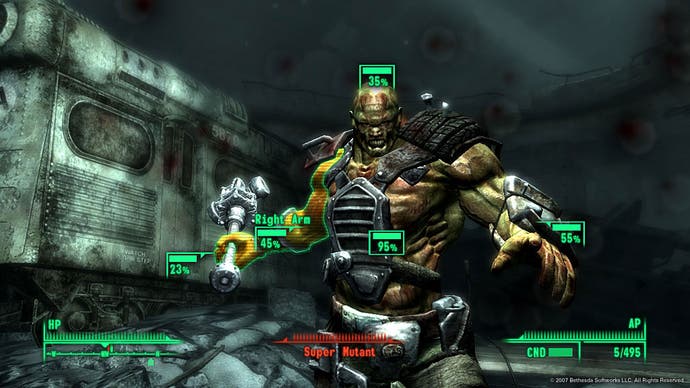
This contrast is certainly one of Fallout's main appeals, and one the TV show plays up to magnificently. Inside Vault 133, Lucy is raised to believe that the Vaults exist to preserve American culture, and that one day her Vault will lead the charge in repopulating and recolonising the country. When Lucy leaves the Vault in pursuit of her kidnapped father, her idealism is the source of endless amusement for the weathered, scarred, sometimes outright rotting inhabitants of the wasteland, and the show revels in countering her lawful good attitude with violence, cynicism, and most brutally of all, truth.
So is the essence of Fallout one of innocence colliding head-on with experience, as idealistic Vault Dwellers contend with the harsh, uncaring realities of the wasteland? It's definitely a theme. But it's worth noting that the Vaults and those who dwell in them have served different roles at different times. The Vaults were originally conceived not so their inhabitants would emerge with an idealised perspective on reality, but with no perspective whatsoever. In the original game, Fallout creator Tim Cain wanted the Vault Dweller's ignorance to line up with the player's lack of foreknowledge of the wasteland. In Fallout 2, you play a descendent of the original Vault Dweller raised outside of the Vaults, while the Vaults themselves take on a more sinister role, with the revelation they have been used to conduct bizarre, often inhumane social experiments on the people sheltering inside them. Fallout 4 gives you context from both ends of the war, putting the player in the role of someone from that pre-war society, cryogenically frozen inside a Vault as the bombs fall, to re-emerge hundreds of years later. Then there's Fallout: New Vegas, where your character has no relationship with the vaults at all.
More broadly, you could argue that such a journey from innocence to experience isn't specific to Fallout. Many RPGs have players starting off with a blank slate, which they then hammer into shape through the gaining of experience (both figuratively and literally). Fallout 1's hermetically-sealed protagonist emerging into radioactive hell might represent an extreme example of this, but they're still following a well-established RPG tradition.
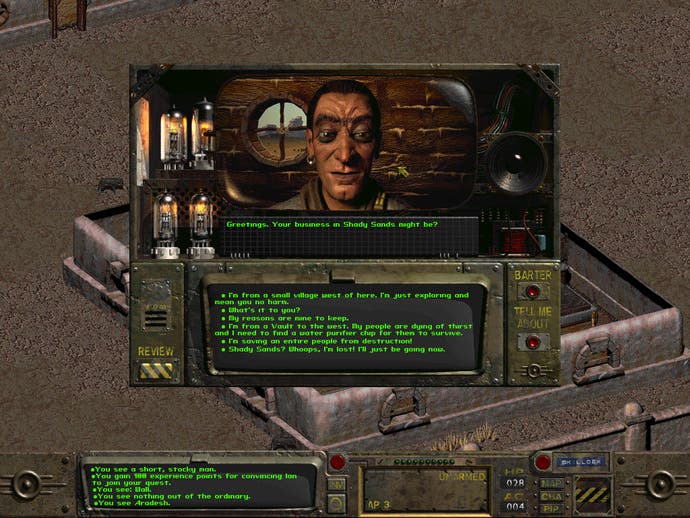
Nonetheless, there is something in the notion that the wasteland reshapes people, that your character building occurs in an explicitly hostile world in which normal rules no longer apply. While its relationship with the Vaults themselves may have shifted over time, this broader notion has been very much present from the outset. The original Fallout ends with the overseer of Vault 13, who sent you into the wasteland in the first place, exiling you from your home as he fears that hearing about your experiences might cause other people in the Vault to leave. You might start as an empty vessel, but whatever you fill it with over the course of the game is still perceived to be corruptive by those you once considered family.
Again, this idea of adaptation against adversity is hardly a startling revelation, but it is fundamental to Fallout's DNA, and not merely as a theme within the game itself. When Fallout released in October 1997, western CRPGs were at their lowest ebb in years. The standard bearers of the genre, series' like Ultima and Wizardry, hadn't delivered a new single-player experience in half a decade (though the former had recently broken new ground with Ultima Online). In that time, their position in PC gaming culture had been superseded by other genres, particularly first-person shooters and real-time strategy. Games like Doom and Command & Conquer offered fast-paced action with a thrilling side of taboo-breaking. They were edgier, grislier, quicker on the trigger, and overwhelmingly popular as a result.
In this context, Fallout was exactly the evolution the RPG needed. With its bloody combat, irreverent tone, loose morality, and weird retrofuturist world, it was perfectly adapted to survive the gaming landscape at that time. This is far from a new perspective, either. Critics at the time were equally aware of Fallout representing a new strain of role-playing. Here are a few words from Charlie Brooker, who knows a thing or two about appalling futures laced with attitude:
"It's a role-playing game. A full-on trad-rock RPG complete with character stats, experience points, armour classes, inventories, and turn-based combat," Brooker wrote in his review of Fallout for PC Zone. "But before you start vomiting: listen up, it's really good fun - honest. For one thing, healthy Tolkien-o-phobics have nothing to fear from Fallout; there isn't an orc or goblin in sight: this is, after all, an exercise in gritty post-apocalyptic sci-fi. Second, it's very much an adult game. Aside from the sobering subject matter, there's a smattering of profane language [and] lashings of grisly unpleasantness."
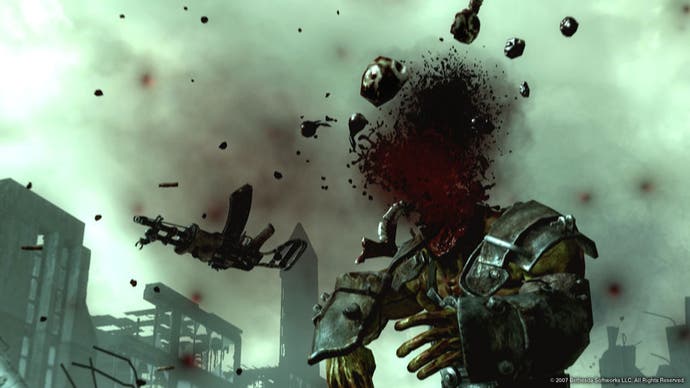
In this way, Fallout isn't just an RPG about adapting to a hazardous environment, it's an RPG born from a need to adapt to a hazardous environment. As a series it has continued to do that, which is partly what makes it so tricky to pin down, why so many people have such strongly diverging opinions on the merits of its various games.
For my part, I think that adaptability is part of Fallout's essence, it is always what it needs to be to thrive. But it also lies in how it views its own world through that flippant, acerbic 1990s lens. In its overarching fiction, Fallout asks many of the same questions as the Last of Us, but it'll also let you play as a character so dumb they can barely ask questions at all. Its world might be grim and violent and nasty, and nearly everyone in it is having a bad time, but it ultimately wants you to have a good one. Whatever else you might take from it is a bonus.
What's most interesting about all of this, however, is that the TV show is also exactly what it needs to be to flourish in the current TV landscape: a hyper-dark, hyper-silly, hyper-violent sci-fi drama. It really isn't like any other prestige show around, and deliberately treads its own path away from the existing games. It's a different animal altogether. Yet at the same time, it is undeniably Fallout.
 |
Watch Fallout for free on Prime Video Start your free 30-day Amazon Prime trial and get access to thousands of films and TV shows including the Fallout series on Prime Video. Prime members also have access to Prime Gaming, exclusive deals, free delivery and more! It will cost £8.99 per month after the trial has ended, or you can cancel during your free trial to avoid paying anything. |
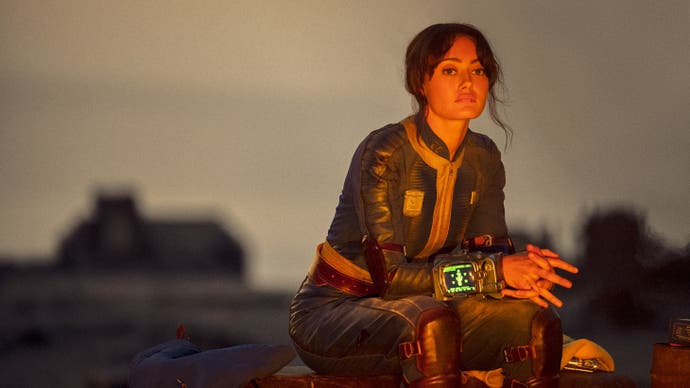



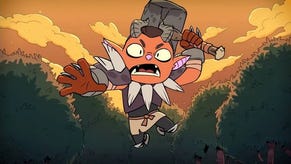
.png?width=291&height=164&fit=crop&quality=80&format=jpg&auto=webp)



